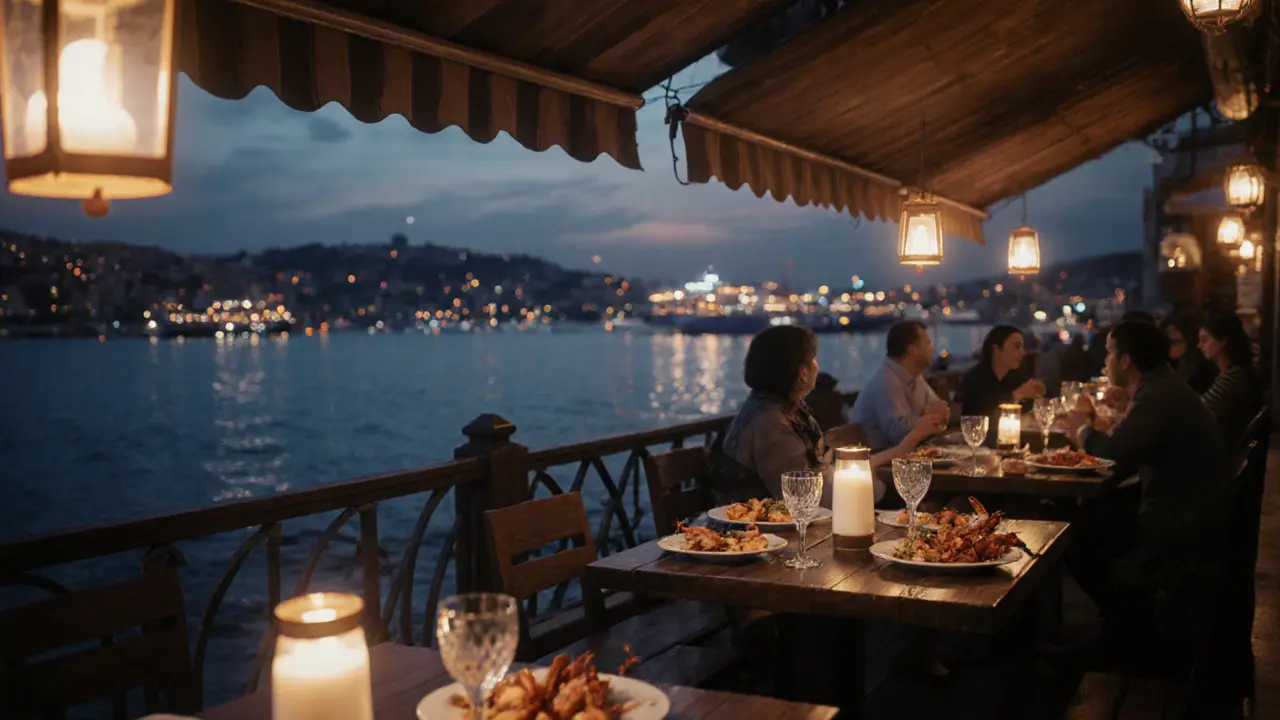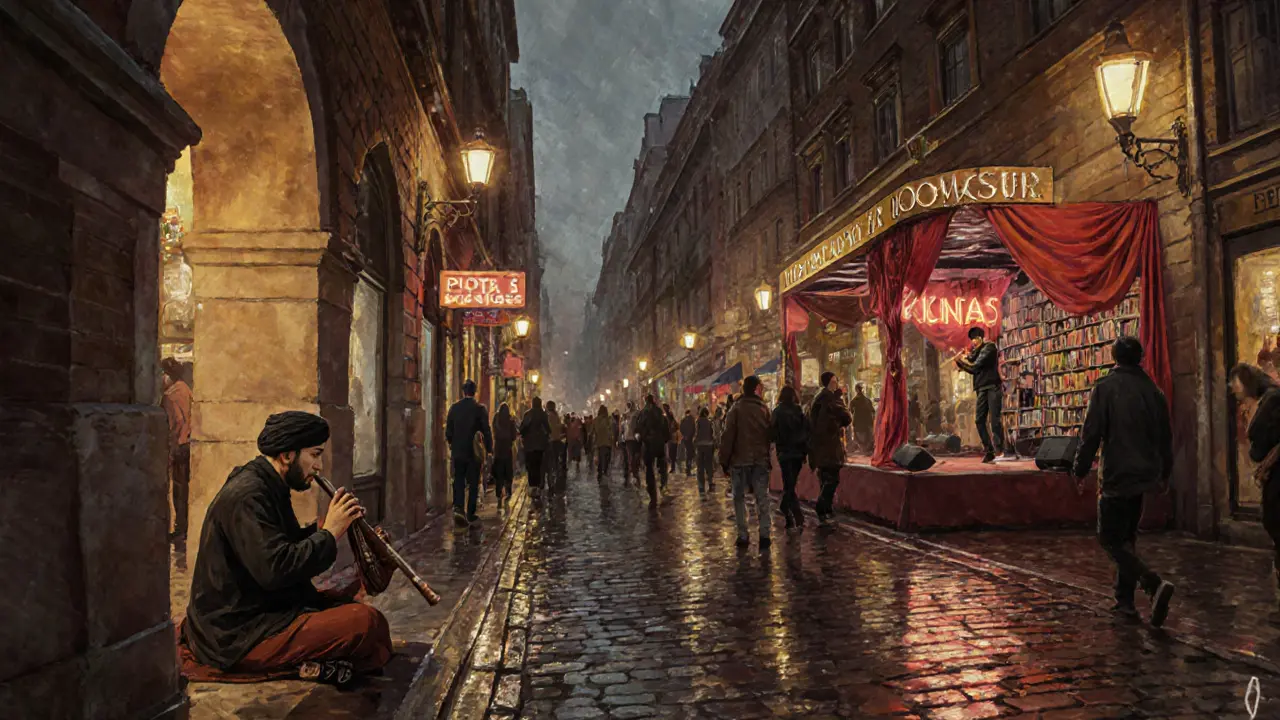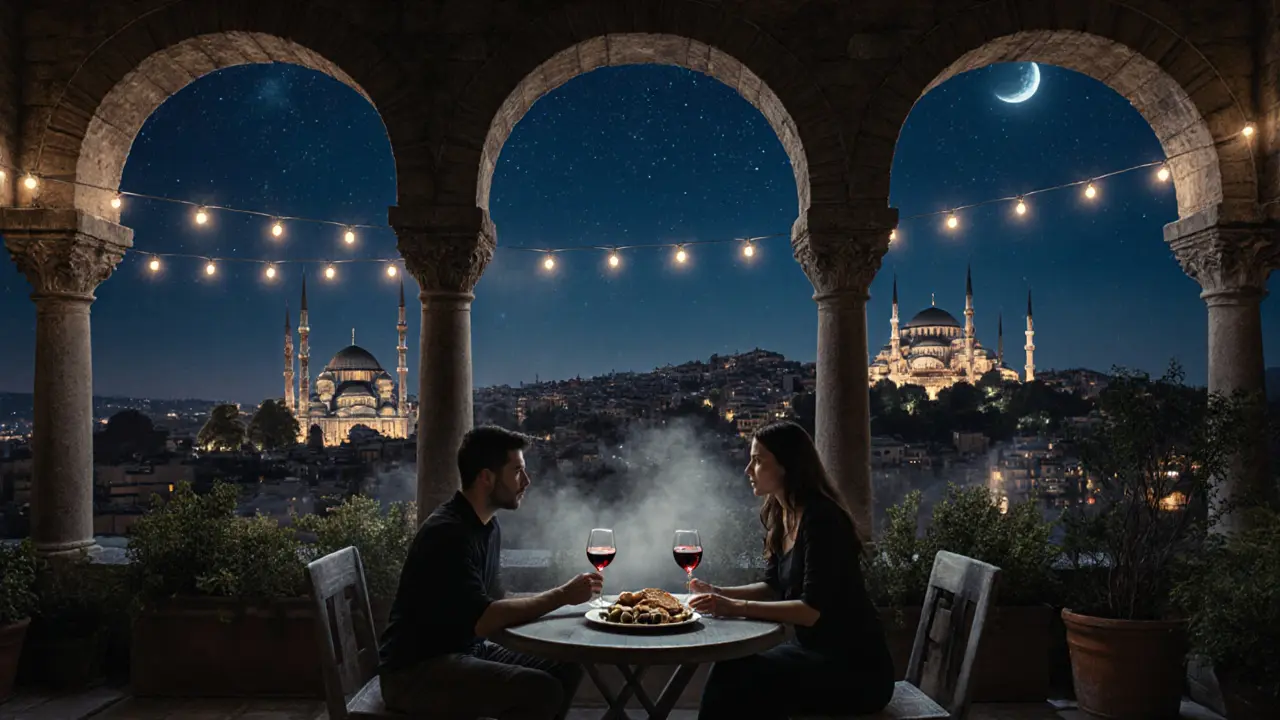The Nightlife of Istanbul: A Cultural and Culinary Experience

Nov, 20 2025
When the sun sets over the Bosphorus, Istanbul doesn’t sleep-it transforms. The city’s nightlife isn’t just about clubs and cocktails; it’s a living blend of centuries-old traditions, street food aromas, live music echoing from hidden courtyards, and the quiet hum of conversation in dimly lit taverns. This isn’t the kind of nightlife you find in London or Berlin. It’s deeper, slower, richer. You don’t just experience it-you taste it, hear it, feel it.
Where the Night Begins: Meze and Rakı on the Water
The real heartbeat of Istanbul’s night starts long before midnight. Head to Karaköy or Beyoğlu, and you’ll find locals gathering at small seaside meyhanes-traditional Turkish taverns-where the ritual begins with a glass of rakı, the anise-flavored spirit known as "lion’s milk." It’s not drunk quickly; it’s sipped slowly, diluted with water until cloudy, always paired with small plates of meze.
Try the haydari-thick yogurt with garlic and dill-or calamari fried crisp and served with lemon. These aren’t appetizers; they’re the foundation of the evening. In places like Asitane or Neolokal, the meze changes with the season. In autumn, you’ll find stuffed pumpkin flowers. In winter, slow-cooked lamb offal in walnut sauce. This isn’t menu-driven dining. It’s culture on a plate.
The Soundtrack of the Night: From Sufi to Hip-Hop
Walk down İstiklal Avenue after 10 p.m., and you’ll hear it all. A ney flute drifting from a small Sufi music venue next door to a young Turkish rapper performing live in a converted bookstore. Istanbul’s nightlife doesn’t force you to choose between old and new-it lets you switch between them in minutes.
In the historic district of Kadıköy on the Asian side, Bar 1914 hosts monthly jazz nights with musicians from Istanbul’s conservatories. On weekends, Chateau de Bosphorus turns into a rooftop dance club with DJs spinning Turkish pop remixes alongside house beats. But the most unforgettable moments happen in unmarked basements-like Elma in Nişantaşı-where acoustic saz players and poets perform for a crowd of 30 people who all know each other.
Street Food After Midnight: The Real Istanbul
Forget fancy restaurants. The best food in Istanbul after dark comes from carts, stalls, and tiny kitchens that open only when the city’s energy peaks.
At 2 a.m., the balık ekmek boats dock along the Eminönü waterfront, serving grilled mackerel sandwiches with onions and lettuce. Just down the street, İmam Çağdaş serves lahmacun-thin, crispy dough topped with spiced minced meat and herbs-still steaming from the oven. Don’t miss the midye dolma, mussels stuffed with rice and pine nuts, sold by women in headscarves who’ve been doing it for 40 years.
These aren’t tourist traps. Locals line up here. You’ll see students, taxi drivers, night-shift nurses, and retirees all eating side by side. The price? Around 15 Turkish lira-less than a dollar. The experience? Priceless.

Hidden Rooftops and Secret Gardens
Istanbul’s skyline is best enjoyed from above. But not the kind of rooftop bars you see in Instagram ads. The real ones are tucked behind unmarked doors, up narrow staircases, or inside courtyards you’d walk past without noticing.
Asmalı Mescit in Beyoğlu has a rooftop garden where you can sit under string lights with a glass of local wine and watch the minarets glow against the night sky. Bar 22 in Nişantaşı doesn’t have a sign. You need a friend to get in. And Leb-i Derya in Karaköy, once a 19th-century warehouse, now serves craft cocktails made with Turkish herbs like sumac and black mulberry.
These places don’t advertise. They don’t need to. Word spreads. You’ll hear about them from a bartender, a taxi driver, or the owner of the kebab shop you ate at earlier.
The Rules of the Night: What No One Tells You
Istanbul’s nightlife follows its own rhythm. There are no hard rules, but there are unwritten codes.
- Don’t rush. Meals last three hours. Drinks are refilled slowly.
- Don’t ask for vodka or whiskey unless you want to look out of place. Rakı, wine, and beer are the real staples.
- Don’t expect 24-hour clubs. Most close by 3 a.m. The party doesn’t end-it moves.
- Don’t ignore the music. If a live saz player starts, stop talking. Listen.
- Don’t tip in euros. Turkish lira only. And leave it on the table, not in the hand.
Locals don’t go out to "party." They go out to connect. To talk. To share stories. To laugh over a plate of olives. That’s the heart of it.

When to Go: Seasons That Shape the Night
Istanbul’s nightlife changes with the weather-and the calendar.
In summer, the Bosphorus comes alive. Ferry rides after midnight turn into floating parties. Rooftops overflow. The air smells like salt and grilling fish.
Winter brings intimacy. Outdoor seating vanishes. But inside, fires crackle in meyhanes. The music gets softer. The conversations get longer. You’ll find locals drinking rakı in wool coats, telling stories about the city’s past.
October and April are the sweet spots. The crowds are thinner. The weather is perfect. The food is at its peak. And the city feels like it’s yours alone.
What You Won’t Find
You won’t find neon-lit strip clubs on İstiklal. You won’t see drunk tourists stumbling out of 24-hour pubs. You won’t hear EDM blasting from every corner. Istanbul’s nightlife isn’t designed for mass consumption. It’s designed for connection.
The closest thing to a "nightclub scene" here is Reina or Küçük Çiftlik Park-both popular, but even they feel more like open-air festivals than clubs. You dance under stars. You eat grilled corn between songs. You leave with your clothes smelling like smoke and rosewater.
This isn’t nightlife as a product. It’s nightlife as a practice. A daily ritual. A way of being.
Is Istanbul nightlife safe for solo travelers?
Yes, Istanbul’s nightlife is generally safe for solo travelers, especially in well-lit, popular areas like Beyoğlu, Karaköy, and Kadıköy. The city has a strong police presence in tourist zones, and locals are often helpful. Avoid isolated alleys after midnight, and trust your instincts. Most bars and restaurants close by 3 a.m., so plan your route home in advance. Taxis are cheap and widely available-use BiTaksi or Uber instead of hailing on the street.
Do I need to dress a certain way for Istanbul nightlife?
No strict dress code exists, but modesty is appreciated, especially in traditional meyhanes and religious neighborhoods. Shorts and tank tops are fine in trendy bars in Beyoğlu, but you’ll blend in better with jeans, a nice top, or a light jacket. For upscale rooftop spots, smart casual works best. Women aren’t required to cover their heads, but doing so in conservative areas like Üsküdar shows respect.
What’s the best time to visit Istanbul for nightlife?
April to June and September to October are ideal. The weather is mild, crowds are smaller, and the city feels more alive without the summer rush. Summer nights are vibrant but packed. Winter nights are quieter but more authentic-perfect if you want to sit by a fireplace and talk with locals over rakı.
Can I find vegetarian or vegan options in Istanbul’s nightlife?
Absolutely. Traditional Turkish meze is naturally plant-forward: stuffed grape leaves, eggplant dips, lentil soup, grilled vegetables, and hummus. Many meyhanes now offer vegan versions of classic dishes. In Kadıköy, Yonca is a fully vegan café-bar that stays open late. Even in busy areas, most places will accommodate dietary needs if you ask politely.
Is it true that alcohol is expensive in Istanbul?
Compared to Europe, yes-alcohol is heavily taxed, so prices are higher. A beer in a bar costs 30-50 Turkish lira ($1-$1.50), and a glass of wine can be 60-100 lira. But rakı is surprisingly affordable, and meyhanes offer great value. A full meze spread with drinks for two rarely exceeds 500 lira ($15). Stick to local brands like Efes beer or Turkish wines from Thrace or Cappadocia for the best quality-to-price ratio.
What Comes After the Night
The next morning, you’ll wake up with the scent of coffee and simit still in your clothes. You’ll remember the laughter, the music, the taste of grilled octopus on a paper plate. You won’t remember the name of the bar you danced in-but you’ll remember how the city felt.
Istanbul’s nightlife isn’t about ticking off venues. It’s about moments. A stranger sharing a plate of olives. A musician playing a tune you’ve never heard but somehow already know. A ferry ride home under a full moon, the water glowing like liquid silver.
This is the real Istanbul. Not the postcards. Not the Instagram feeds. The quiet, messy, beautiful rhythm of a city that knows how to live.